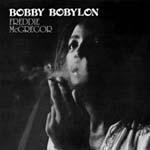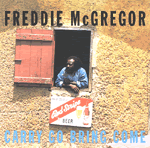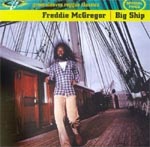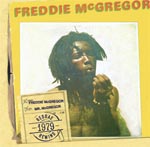FREDDIE
McGREGOR
(b. 1956 - )
BOBBY BOBYLON * * * * *  1971-1979 - Heartbeat - studio - discs: 1
1971-1979 - Heartbeat - studio - discs: 1Freddie McGregor was born on June 27, 1956 in the Clarendon Parish. At the very young age of seven Little Freddie was brought to Studio One by the Clarendonians (Ernest "Fitzroy" Wlson and Peter Austin). By the mid 60's the Clarendonians split and Freddie started to record with Wilson as Freddie & Fitzy. Clement Dodd released "Why Did You Do It", "Do Good", "The Truth Hurts" and "Why Did My Little Girl Cry" in 1966 and 1967. He also released solo material from McGregor as Little Freddie between 1966 and 1968: "Too Young To Love", "I'm Feeling Good" and "After Laughter". Freddie continued to record for Coxsone during the 70's. His songs were built around his Rastafarian beliefs and love issues. In 1979 his debut "Mr. McGregor" was released by the producer Niney The Observer. In 1980 Coxsone released his Studio One debut which consists of songs recorded during the previous decade. The original set contained ten songs with a running time of just over thirty minutes: "Bandulo", "We Need More Love", "What Difference Does It Make", "Go Away Pretty Girl", "Tomorrow Is Like Today", "Bobby Bobylon", "Wine Of Violence", "Gonna Take Over Now", "Rastaman Camp" and "I Am A Revolutionist". Here follows some informations about those songs. "Bandulo" uses the rhythm "Soulful Music" (1968) by the Invaders. "We Need More Love" (first release: 1980) uses the rhythm "I Make A Woman" (1968) by the Kingstonians. "What Difference Does It Make" is a version of a song previously cut by Freddie. "Go Away Pretty Girl" was released in 1971 as a single. This is an updated version. "Tomorrow Is Like Today" (first release: 1980) follows. "Bobby Bobylon" (first release: 1980) uses Jackie Mittoo's "One Step Beyond". "Wine Of Violence" uses "Undying Love" by Ernest Wilson (first release: 1980). "Gonna Take Over Now" (first release: 1980) uses "I'm Gonna Take Over Now" by The Ethiopians. "Rastaman Camp" was recorded in 1975 and released in 1976. This is an updated version. "I Am A Revolutionist" (first release: 1979) is a recut version of Freddie's "I Man A Rasta" (1976). This version firstly appeared in 1980. This is the original core of "Bobby Bobylon". The re-release in 2006 offers eight bonus tracks. Here follows some informations about those bonus, which never appeared on CD before. "Freddie" was originally released in 1975 "Studio One Sales Conference Vol.1" album. "Homeward Bound" was a 1979 hit. It seems that the flute is played by Tommy McCook. "Little Girl", released in 1978, uses "Love Me Girl" by the Heptones. "When I'm Ready / Jacklyn" was a hit in 1981 as "When I'm Ready" and it used "A Love I Can Feel" (1970) by John Holt. This extended version features Lone Ranger's "Jacklyn". "Come Now Sister", released in 1979, uses "Get In The Groove" by the Heptones. "I Man A Rasta" is a single from 1979, recut and retitled "I Am A Revolutionist" in 1979. "Rastaman Camp" (1975) follows. "Bobby Bobylon / One Step Beyond" (previously unreleased) includes parts of Jackie Mittoo's "One Step Beyond". Well, that is it with the main informations. Talking about this release, but especially about the main original core, is really a tough thing. The material is such ethereogeneous that no real complete shape comes out. The songs are mainly recut of vintage songs and reworkings of previous Freddie's material. But even if everything seems as something not new, there is an incredible cleareness and new light shining on. It is like a very old car with some proper work to make its engine roar again and a new polish on its exterior: in this case some vintage songs that shine for what they are, a marvellous musical sculpture that stands high above some of its rivals. This edition with the bonus tracks is unmissable. My preferred track is "Rastaman Camp" (from the main set), with its Nyahbinghi dark and deep atmosphere: a real Rastafari chant that could (and should) be five hours long! 1. Bandulo
CARRY GO BRING HOME
* *  1993 - Greensleeves - studio - discs: 1
1993 - Greensleeves - studio - discs: 1This 1993 set stands miles below Freddie reputation and skills. It mood is basecally pop, and this do not help at all. Gregory Isaac's "Night Nurse" is reduced to a poor pop slow tune and it is quite embarassing. As with this track all the rest is uninspired. The arrangements are structured on an unlistenable tasteless digital - pop mood. Maybe Freddie himself got it and put a second version of Justin Hinds "Carry Go Bring Come" at the end with a Rocksteady flavour. But you cannot save a set with one song. "Land Of The Rising Sun" is a little bit better than the other songs, but it is an "all inclusive resort" kind of song. And unfortunately it is not the only one: "I Want Love" has the same approch and poor result. The only other songs that maybe can be saved are "Ghetto Street" and "It's So Hard", but in any case they are very tastless. This set is almost depressing.
BIG SHIP * * * /  1982 - Greensleeves - studio - discs: 1
1982 - Greensleeves - studio - discs: 1"Big Ship" is a good set indeed. This ten tracks set was cut in 1982 for the singer turned producer Linval Thompson, at the time releasing strong material as was doing the other great Dancehall producer, Mr. Henry "Junjo" Lawes. The album opens with the title track "Big Ship", setting the general mood of this release: Dancehall from the early 80's at its best. Confident as he was when approacing the sounds of the previous decade, Freddie continues with the second song called "Sweet Lady". The third track is the deep "Peaceful Man", a Rastafari call for a peaceful existance. Follows "Stop Loving You", inna Dancehall - Lovers mood. The fifth song is "Get Serious", with a sweet and melodic approch from Freddie. Follows the second strong song of the set, the serious love declaration called "Don't Play The Fool". The seventh track is "Get United", asking for peace in the blood filled Kingston ghettos. Follows "Let Me Be The One", the third strong and deep song of "Big Ship". The nineth track is "Roots Man Skanking", a relaxed tune. The set closes with "Holy Mount Zion". Perfectly balanced between love songs and "Cultural" issues, "Big Ship" is a small gem from one of the greatest voices of Reggae. Freddie is backed by the shining sounds of the Roots Radics. The songs were mixed by the unique Scientist and cut at Channel One and Harry J.
Mc.GREGOR * * * /
"Mr. McGregor" is the debut album of Freddie McGregor. Some earlier material had already been cut during the previous years but it would appear only one year later for Coxsone Dodd. That seminal set was the stellar "Bobby Bobylon". "Mr. McGregor" was produced by Winston "Niney The Observer" Holness, recorded and mixed at Channel One The mixing board was managed by Crucial Bunny (also known as Anthony Graham, Bunny Graham, Bunny Tom Tom) and Maxie. Originally presenting ten tracks, this re-release contains seven bonus tracks, four of which are discomixes. The set opens with the great "We Got Love", a track originally from The Heptones. This is followed by Rastafari filled "Walls Of Jericho". The third track is called "Jah Can Count On I", a version of a song by Little Roy. Follows "Oh No, Not My Baby", an American 60's Pop song written by Gerry Goffin and Carole King. The fifth track is "Why Did You Do It", a song originally recoreded by the British band Stretch. Follows "Zion Chant", a Freddie's composition also rendered by Judy Mowatt in her stellar "Black Woman" album. The seventh song is the marvellous "Rastaman Camp", which was previously cut for Dodd and appeared in the "Bobby Bobylon". This is a less edgy version but it still keeps the strength of its counterpart. Follows "Do Good", easy and inspiring. The nineth track is "Brandy", followed by "Rasta Have Faith", a strong song constructed on the immortal "Satta Massagana" rhythm by the Abyssinians and presented here in its extended version. The selection of bonus tracks reads "Lovers Rock J.A. Style" (Extended), "Jah A We Father (Love One Another)", "The Overseer" (Extended), "Chant It Down" (Extended), "Sitting In The Park" (Extended) (originally a 1964 song by the American Soul singer Billy Stewart, and versioned in Jamaica by Alton Ellis, Slim Smith, Dr. Alimantado, Anthony Johnson, Junior Reid and Glen Washington), "Jah Will Bless You", and "Roman Soldiers". The personnel on this intersting set was Horsemouth Wallace and Max Edwards (drums), Fully Fullwood (bass), Tony Chin, Bingy Bunny and Earl "Chinna" Smith (guitar), Keith Sterling and Jamaka Johnson (keyboards), Enroy Grant, Arnold Breckenridge and Donald Vidan Greaves (horns), and Bongo Herman and Bloucksy (percussions). |
 1979 - 17 North Parade - studio - discs: 1
1979 - 17 North Parade - studio - discs: 1